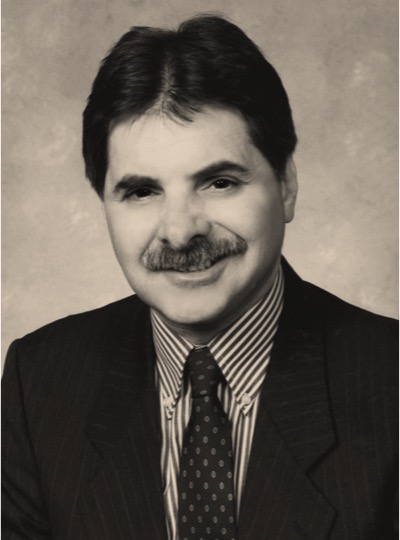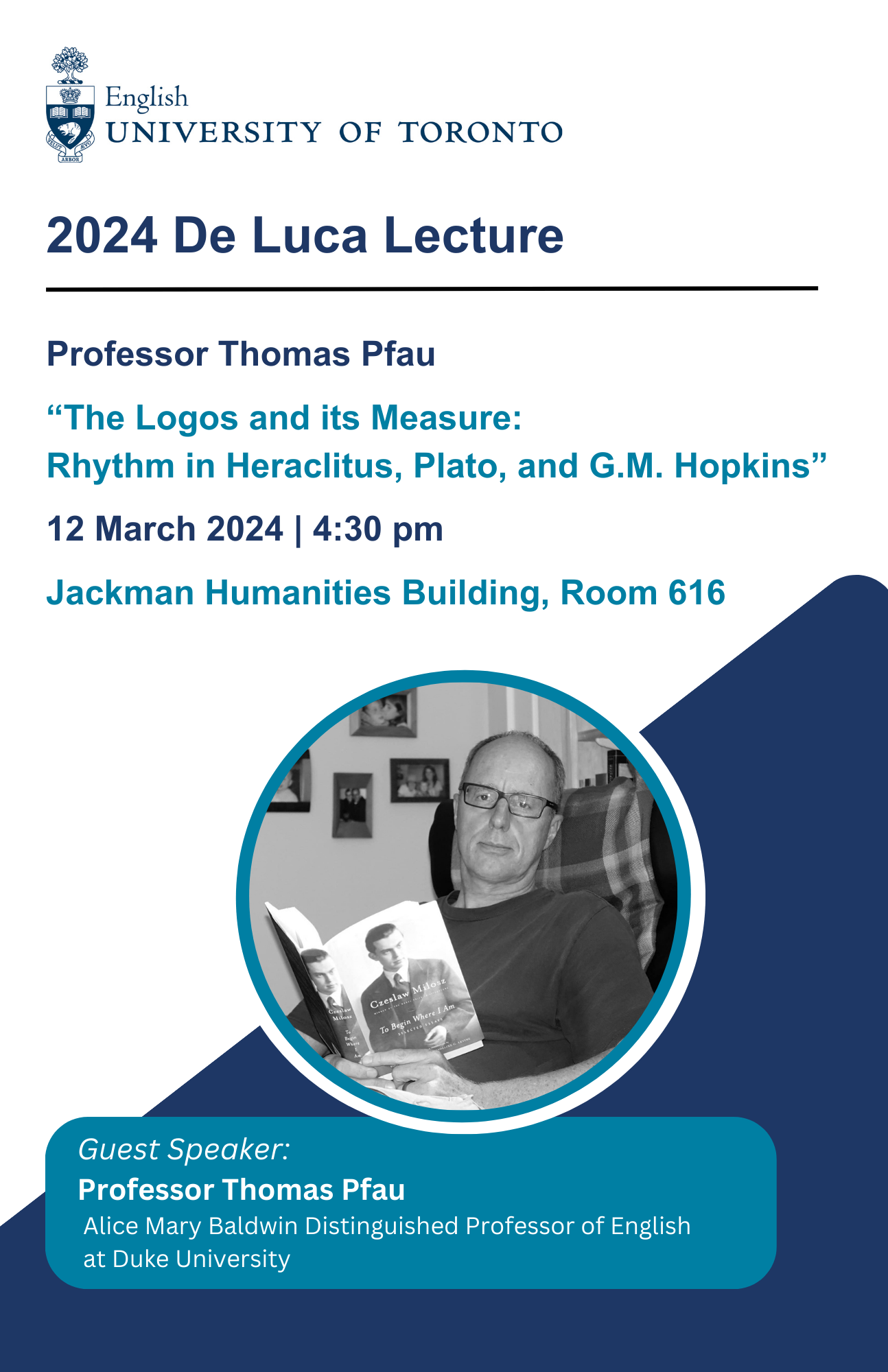Vincent A. De Luca received his B.A. from Hamilton College and his M.A. and Ph.D. from Yale University. He taught for six years at Cornell University before joining the faculty at the University of Toronto. In addition to writing articles on Romantic-period literature, Professor De Luca authored two books: Thomas De Quincey: The Prose of Vision (Toronto, 1980) and Words of Eternity: Blake and the Poetics of the Sublime (Princeton, 1991). Of the latter, Robert N. Essick observed, “Words of Eternity is one of the dozen or so most important books ever written about Blake’s poetry. De Luca provides a wealth of new insights on every page.”
Eternity is one of the dozen or so most important books ever written about Blake’s poetry. De Luca provides a wealth of new insights on every page.”
Professor De Luca was a dedicated teacher and scholar whose high expectations brought out the best in his students and colleagues. This quality of his persona is reflected in his legacy at the University of Toronto today. In the Department of English, he made provision to establish the first fellowship for a graduate student. Shortly after his passing, planning began to create the first endowed lecture series in the Department of English, the Vincent A. De Luca lecture.
The Vincent A. De Luca Lecture in Nineteenth-Century Studies is a lecture series hosted by the Department of English at the University of Toronto. Held in honour of our late colleague, the lecture is given by an esteemed scholar, recognized for his or her work in the field of early nineteenth-century literature and culture. Lectures take place yearly during the winter term and attendance is open to faculty, graduate students, and independent scholars.
Upcoming Lecture:
Professor Thomas Pfau
Date: March 12, 2024
Time: 4:30pm
Location: Jackman Humanities Building, Room 616
 Abstract:
Abstract:
“The logos and its Measure: Rhythm in Heraclitus, Plato, and G. M. Hopkins”
Précis: My lecture will take up the concept of “rhythm” and try to show a deep-structural link between its formal-poetic and its metaphysical dimensions. To that end, I’ll begin with some remarks about how Heraclitus and Plato conceive of rhythm (rhythmos) as the indispensable yet intrinsically variable “measure” (metron) of all intelligible speech (logos). From here I will move on to my main thesis: namely, that in the aftermath of neo-classical (Augustan) poetics and aesthetics, and their insistence on regular meter, formal symmetries, and “quadratic form” (C. Dahlhaus), there occurs a major shift in poetry (and in music) starting around 1800. Thus, following the experiments with non-accentual verse by the early Coleridge, we can observe in Hölderlin’s late hymns (1802-1803), the great lyrics of G. M. Hopkins, and Paul Claudel’s Cinq grandes odes (1910) a concerted attempt to reintroduce a classical-metaphysical concept of rhythm into poetic speech. The second part of my lecture will explore this development in G. M. Hopkins’s theory of “sprung rhythm” and its application in “The Wreck of the Deutschland” (1875). Uniquely, Hopkins’s ode stages its central antinomy – between an Ignatian theology of suffering and a Dionysian theology of beauty – as an objective and immutable systolic / diastolic rhythm that, as in ancient Greek thought, pervades both the sensory and intelligible dimensions of the poetic word.
Past speakers:
Professor Mary Favret, Johns Hopkins University
"Frederick Douglass's Pride and Prejudice"
Thursday, March 28, 2019
Professor Devoney, Looser, Arizona State University
"The Afterlife of Jane Austen's Sense and Sensibility"
Tuesday March 27, 2018
Professor Jon Mee, University of York
"Literature of Power, Literature of Knowledge: The Transpennine Enlightenment and the Antagonism of Thomas De Quincey."
Tuesday April 4 2017
Professor Andrew Elfenbein, University of Minnesota
"Remembrance of Things Read"
Thursday 8 March 2016
Professor Ian Duncan, UC Berkeley
"Bildung of Humanity: Anthropology, Irony, and the Romantic Novel"
Wednesday 8 April 2015
Professor Denise Gigante, Stanford University
"The Other Ozymandias: Romanticism and Bibliomania"
Monday 24 March 2014
Professor Judith Pascoe, University of Iowa
"Wuthering Heights: Japanese Style"
Friday 15 March 2013
Professor Adela Pinch, University of Michigan
"Mind of Rock: The Allure of Panpsychism in Victorian England"
Tuesday 20 March 2012
Professor Meredith McGill, Rutgers University
"Form After Format: The Circulation of Poetry in the Antebellum U.S."
Tuesday 8 March 2011
Professor Ina Ferris, University of Ottawa
"Past Particular: Historical Romance and the Question of Antiquarianism"
Friday 19 March 2010
Professor Seamus Perry, University of Oxford
"Arnold and Poetry"
Tuesday 24 March 2009
Professor James K. Chandler, University of Chicago
"Sentimental Monstrosity: Rousseau, Mary Shelley, and Beyond"
Wednesday 7 November 2007
Professor Timothy Morton, University of California
"Dark Ecology: Theory and Environmentality"
Wednesday 1 November 2006
Professor Deidre Lynch, Indiana University
"Young Ladies are Delicate Plants": Jane Austen and Greenhouse Romanticism"
Monday 14 November 2005
Professor Houston A. Baker Jr., Duke University
"Wordsworth and the Black Sublime in Los Angeles"
Thursday 3 March 2005
Professor Saree Makdisi, University of California
"Virtuous Despotism: Self, Empire and the Cultural Politics of Liberation, 1790-1835"
Thursday 11 March 2004
Professor Isobel Armstrong, University of London
"Victorian Poetry: the poetics of glass and optical modernity"
Monday 17 March 2003
Professor Peter J. Manning, State University of New York
"Ours is a time when the poem no longer serves to ‘haunt, startle, to waylay': Reading Late Wordsworth"
Wednesday 13 March 2002
Professor Theresa Kelley, University of Wisconsin
"John Clare's 'Natural' Mimicry and Hybrid Poetics"
Tuesday 27 February 2001
Professor Susan Wolfson, Princeton University
"Launching a Modern Edition of Felicia Hemans"
Thursday 2 March 2000
Professor Lawrence Buell, Harvard University
"The War for the Soul of the American Poetic Tradition"
Thursday 18 March 1999
Professor John Hollander, Yale University
"A Form of Loss and Retrieval"
Tuesday 24 February 1998
Professor Herbert Tucker, University of Virginia
"Of Monuments and Moments: Spacetime in 19th-Century British Poetry"
Thursday 6 February 1997
Professor Stuart Curran, University of Pennsylvania
"Women Romantic Poets: Inscribing the Self"
Wednesday 14 February 1996
Professor Robert Essick, University of California/Riverside
"Representation, Anxiety, and the Bibliographic Sublime"
Monday 27 February 1995


